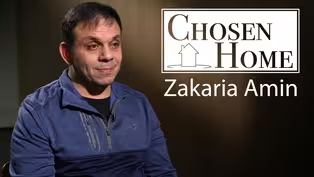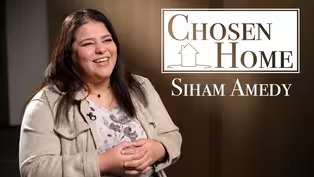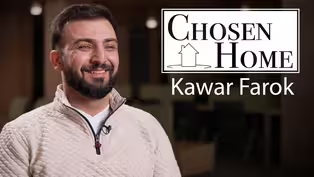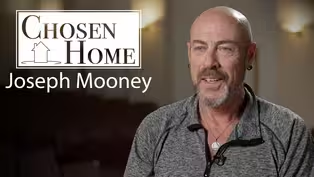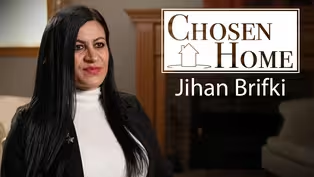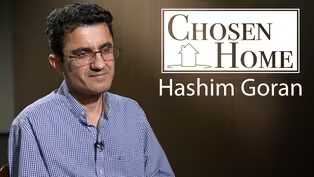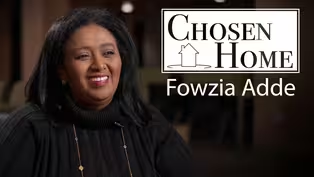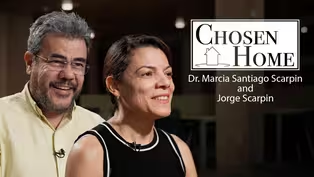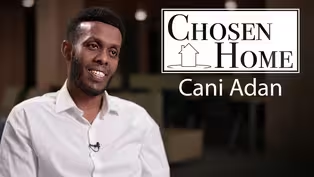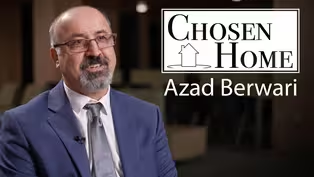Chosen Home: Kawar Farok
Clip | 6m 18sVideo has Closed Captions
Kawar Farok shares his immigration story.
Kawar Farok shares his story of being born in a refugee camp in Turkey and how his family helped Kurds find a new start in Moorhead, MN.
Problems playing video? | Closed Captioning Feedback
Problems playing video? | Closed Captioning Feedback
Chosen Home: Kawar Farok
Clip | 6m 18sVideo has Closed Captions
Kawar Farok shares his story of being born in a refugee camp in Turkey and how his family helped Kurds find a new start in Moorhead, MN.
Problems playing video? | Closed Captioning Feedback
How to Watch
is available to stream on pbs.org and the free PBS App, available on iPhone, Apple TV, Android TV, Android smartphones, Amazon Fire TV, Amazon Fire Tablet, Roku, Samsung Smart TV, and Vizio.
- My name is Kawar Farok.
I'm from the Kurdistan part of Iraq, but I was never born there.
I was born in refugee camp in Turkey.
Back in 1988, March 16th, Saddam Hussein used chemical gases on Kurds.
We found out that our village was gonna be gassed next.
My grandfather was the village leader for 35 years, so he had word that we were gonna be gassed after that village that had just lost about 5,000 people within minutes and 10,000 people, more than 10,000 wounded, and some still have biological defects in birth to this day.
My parents left and fled.
So when we fled to Turkey, Turkey, again, being an oppressor of Kurds for hundreds and hundreds of years, Turkey told us we were not gonna be allowed in.
And they threatened to submit us back to Saddam Hussein's forces, which would've been pure genocide.
Eventually, they succumbed to pressure from UN and from the Western powers, and they allowed us through.
That was back in 1988 my parents got, went there late 1888.
I was born a year later in 1989.
My parents spent four years in refugee camps.
I know it's really hard for Americans to relate, and when I say Americans, I'm an American, but I mean general people that have never left their country.
It's extremely hard to relate to a refugee or someone leaving persecution because you've never been in a situation where you just gather a backpack or a bag and then you're on your way.
There's no time to grab a couch and a bed and haul it with you in a U-Haul truck.
It doesn't exist.
My uncle being one of the leaders of the refugee camp in Turkey of about 10,000 people, had correspondence with my relative here.
And they made sure that they could find some way for America even to give safe passage to asylum seekers.
Majority of the people that landed here in 1991, 92 and San Diego, California, was the responsibility of that individual who was a distant relative of mine, and by my uncle's hand, who wrote their names down a piece of paper.
My uncle wrote the names, but my uncle didn't write our name.
My mom is the reason why I'm here.
My grandfather said, "I want my son to come back with me to go back to home to Kurdistan."
Once the war and everything was over, they were gonna go back to Kurdistan.
Saddam kind of gave this false of, we'll forgive people that wanna come back.
'Cause he needed people to work.
That's originally what it was.
So my mother told my grandfather and my uncle and my father, "I am going to America with my kids, and if you allow your son to come with me, I would love that.
But if you don't allow your son to come with me, I'm gonna go give my kids a future, because there was nothing for us back in Kurdistan."
I mean, imagine being Muslim in a refugee camp.
There's 22 Arab countries in the Middle East, 45 and all, not one extended their hand to Kurds.
Imagine.
You are told, as far as you can remember, we're brothers, we're brothers in religion, and then not one extends their hand, but rather a Christian country called America and a Christian church in Fargo, and a Christian individual in Lisa as our sponsor decided to help us.
It was quite difficult from many fronts.
From one, my parents didn't understand anything.
That was the first difficulty.
Secondly, I was ashamed of my parents, but, you know, I adored my parents more than anything in the world.
But I can admittedly say when I was younger growing up, I knew the language.
You know, when you're young, you're a sponge.
So I learned extremely quickly.
I became a translator for my parents at seven years old.
As a young kid growing up here.
and maybe it holds true for many cultures or many waves of migration or immigration that have come here, where the kids are the conductors.
I feel like parents are at the mercy of their kids' ability to speak and translate.
As you get older, you gain a much better appreciation for life and family.
And now, I would never be ashamed of my parents.
They can go with me and talk Kurdish as loud as they want in any store they want, or any mall they want, wherever it is.
And I'll proudly sit there and talk Kurdish with them.
You know, and they say the second generation typically loses a mother tongue, and that holds true.
And I'm a proven fact of that.
My kids know Kurdish to a very limited degree.
They don't know much.
They just know their Kurds.
I mean, my oldest is six, my second oldest is four, and I have a newborn that's five months almost.
But I did something that my parents couldn't do.
I gave them names that were both able to use in Kurdish and English, therefore, my kids wouldn't feel the way I felt because when your teacher struggles on a name you know it's yours.
And I had that happen throughout my life.
Most of my life being Kawar, whenever a teacher would struggle on roll call, I would just put my hand up.
But I named my daughter Ava, which Ava and Kurdish means foundation.
And when my wife and I got married and we had our first kid, we wanted that to be our foundation.
So we named her Ava.
My son's name is Ari, and Ari is also in Kurdish.
So it goes both ways, Ari and Ari.
And then my youngest is Avi.
Avi really doesn't hold much meaning in English.
In Kurdish, it means an area with plenty of water.
So I gave my kids names, at least where general population can say their name without any fear of, "Oh, they're not American," which, unfortunately, it's true.
With people, my generation though, which is probably the first wave of kids from the '91, '92, immigration, this is home for us.
I mean, when I go to Kurdistan, I love it.
I absolutely love it.
People around me all speak the same language I do, the culture, the food, everything's great.
But I still miss Morehead.
(soft music) - [Narrator] Funded by the Minnesota Arts and Cultural Heritage Fund, with money from the vote of the people of Minnesota on November 4th, 2008, and by the members of Prairie Public.
Video has Closed Captions
Clip | 6m 13s | Zakaria Amin shares his immigration story. (6m 13s)
Video has Closed Captions
Clip | 4m 36s | Siham Amedy shares her immigration story. (4m 36s)
Video has Closed Captions
Clip | 6m 18s | Kawar Farok shares his immigration story. (6m 18s)
Video has Closed Captions
Clip | 4m 24s | Joseph Mooney shares his immigration story. (4m 24s)
Video has Closed Captions
Clip | 5m 59s | Jihan Brifki shares her immigration story. (5m 59s)
Video has Closed Captions
Clip | 7m 45s | Hashim Goran shares his immigration story. (7m 45s)
Video has Closed Captions
Clip | 6m 14s | Fowzia Adde shares her immigration story. (6m 14s)
Chosen Home: Dr. Marcia Santiago Scarpin and Jorge Scarpin
Video has Closed Captions
Clip | 7m 25s | Dr. Marcia Santiago Scarpin and Jorge Scarpin share their immigration story. (7m 25s)
Video has Closed Captions
Clip | 5m 19s | Cani Adan shares his immigration story. (5m 19s)
Video has Closed Captions
Clip | 5m 46s | Azad Berwari shares his immigration story (5m 46s)
Providing Support for PBS.org
Learn Moreabout PBS online sponsorshipSupport for PBS provided by:
